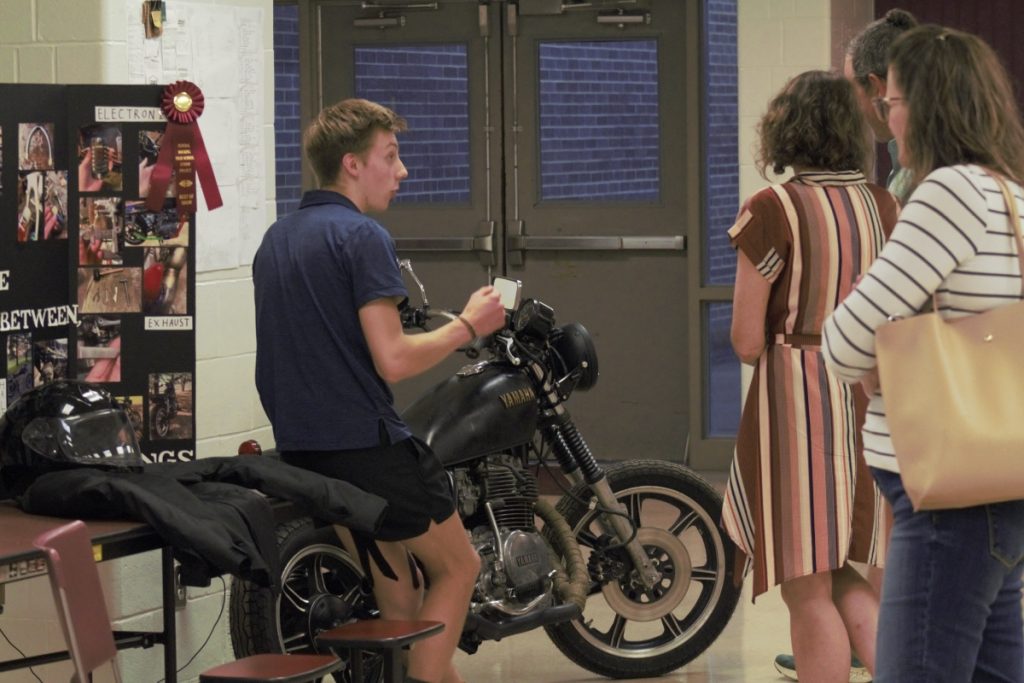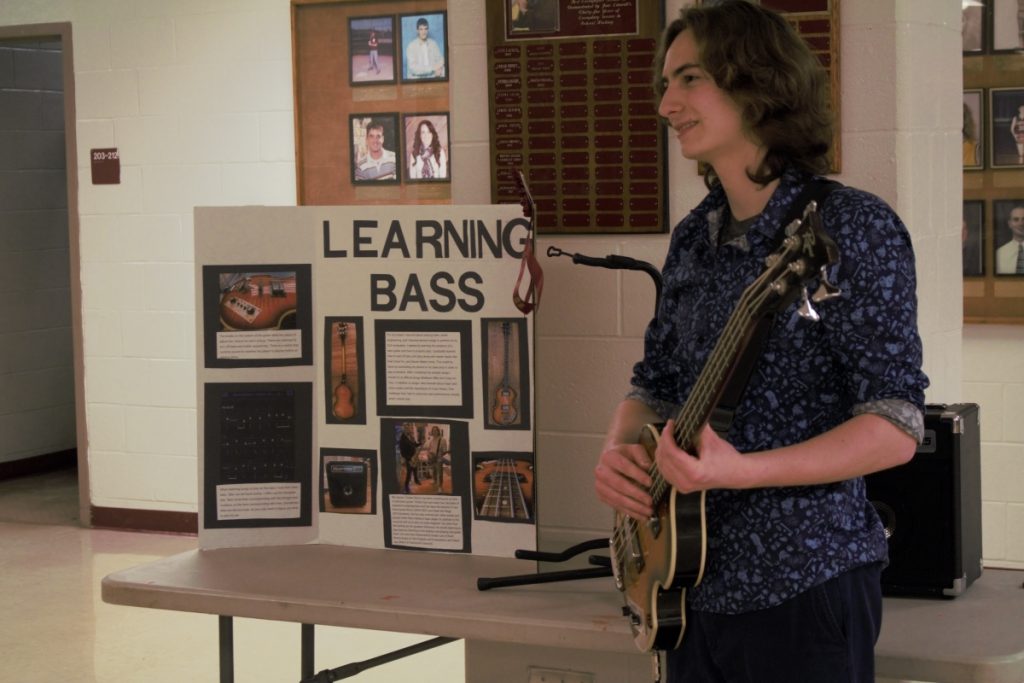News
Fed Hock’s senior project requirement draws criticism and praise as the district considers changes
By: Theo Peck-Suzuki | Report for America
Posted on:
STEWART, Ohio (WOUB/Report for America) — Myles Vorisek has parked a black 1981 Yamaha motorcycle in the hallway of Federal Hocking High School.
It’s not a senior prank. Vorisek, who is graduating this year, rebuilt the bike more or less from scratch for his 100-hour culminating learning experience — otherwise known as the Fed Hock senior project. Now, he’s showing it off to parents and other interested visitors.
“There were a lot of times when I just wanted to give up because it sucked and things weren’t working, but I didn’t,” Vorisek said. “The biggest quality I’m carrying out of this is persistence and creativity.”
The bike is having idling issues, which Vorisek suspects is due to a fuel delivery problem. If he can get that sorted out, he plans to make the motorcycle his commuter vehicle when he starts at Ohio University’s Russ College of Engineering.
“Campus parking passes for motorcycles — they cost nothing,” he said.

The projects are pass/fail, and students can choose to take on any topic that interests them. Senior Magnolia Ballew raised $2,500 and learned Spanish so that she could spend a week taking surfing lessons in Costa Rica. Senior Sheridan Boyd wants to be an agricultural teacher; she learned to artificially inseminate cows. Senior Alex McCartney learned to play bass guitar, while senior Preslei Nelson studied photography.
Starting their junior year or earlier, each student works closely with teachers and an out-of-school mentor to design and implement the project. School officials said it’s extremely rare for anyone not to finish on time. Nevertheless, the projects constitute at least 100 hours of extra work for students outside school (Vorisek said he put in closer to 300). On top of that, Fed Hock students must complete 27 credits to graduate — seven more than the state minimum.
The heightened requirements have prompted some parents to take their kids out of the district. That’s what Jennifer Sedwick did with her two sons.
“I knew that my children were not going to fare well on that,” Sedwick said.
Sedwick graduated from Fed Hock before the district introduced the senior project. She thinks the projects can be great for some kids — just not hers. In the comments to a post from the district on Facebook, other parents and Fed Hock alumni echoed her feelings.

“Our discussion here is, is it a thing that everybody should do, and does everybody benefit from it if you require it?” said Superintendent David Hanning.
Hanning said he’s heard a range of concerns about the project. He wonders if being pass/fail has made it perfunctory for some students. There’s also a question of equity.
“Most of that project is done outside of school. So, you know, can parents support it? Can they support it with their time? Can they support it financially? Can they support it by getting a student to a place?” Hanning said. “Is it fair to have a project like that if you can’t ensure that every student has access to the same types of resources?”
Hanning’s predecessor, George Wood, said that’s exactly why the senior project should stay mandatory. He worries making it optional will perpetuate expectations about who can achieve and who can’t.
“It leads to a multi-tiered education system where some kids get a lot and some don’t get much,” Wood said.
Wood was superintendent when the district introduced both the senior project and the heightened credit requirements. He said they set expectations high because of reports that students weren’t leaving Fed Hock with the skills they needed for whatever came next.
“One of the things we heard from employers, we heard from colleges, we even heard from kids, was that while our graduates might be really good at doing what teachers asked them to do, they weren’t so good at designing, planning, carrying out their own work,” Wood explained.
That’s also why the projects involve finding a mentor outside school.
“Really, that’s what life is all about, right? You get out there in the world, you have to do work, you need to find people who can help you and carry it out,” Wood said.
Wood also defended the 27-credit requirement.
“If kids are in class, if you provide them the support, there’s no reason why they shouldn’t pass way more than (the state minimum of) 20 credits,” he said.
“I don’t think making school easier for kids makes the rest of their life easier,” he added. “Things are demanding. Things are tough.”
For his part, Hanning said he can also understand arguments for keeping the project mandatory.
“There’s a lot of value in doing something. And maybe when you’re 17 or 18 years old, you don’t see the value in it, but when you’re 28, you will,” he said.

Among the Fed Hock students who just finished their projects, the idea of making them optional gets mixed reviews.
“I don’t think it’s for everyone,” said senior Katelyn Miller, whose project involved reading, and then writing about, a range of books outside her literary comfort zone. While she said she benefited greatly from the experience, she isn’t sure the same is true of all students.
“A lot of people struggle to get through high school as it is,” she said.
Sheridan Boyd, whose mother serves on the school board, had a different opinion.
“I think they should be mandatory,” she said. “It’s something unique to our school. Not too many other schools do anything like this, and it kind of gives us a sense of what we’re gonna do in our future.”
Senior Jon Slaybaugh, who learned to cook wild edibles such as venison and mushrooms for his project, took a similar view.
“I think they should keep the project. It is, A, a lot of fun, and B, it teaches a lot of people new stuff that they need for life. Like, some people don’t know how to cook going out of high school, and that is an important skill that you’re going to need for the rest of your life,” he said.
Magnolia Ballew said she worries what will happen if the project becomes optional.
“This does push the student,” she said. “This project makes you go above and beyond, and if it was optional, every year less and less students would do it.”

